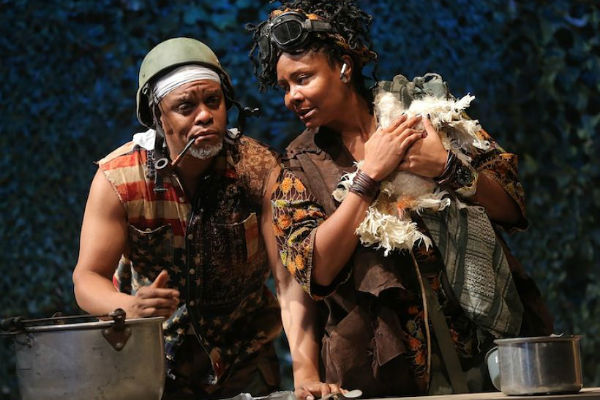 By Souleo
By Souleo
Woodie King, Jr., producing director of New Federal Theatre, was immediately concerned after Tonya Pinkins publicly challenged a Classic Stage Company production of Mother Courage and Her Children in which she was to play the title character. The Tony-winning actress cited issues with the production’s representation of people of color.
“I hope and pray artistic directors of major theaters will really hear what is going on and not blame Tonya Pinkins ‘cause she was absolutely right to be concerned about the work she is doing,” said King, who directed Pinkins in 2014 in The Fabulous Miss Marie. “I hope she is not blackballed. It is a concern because white people see African-Americans as just good or bad. There are no gray areas.”
Pinkins surprised many in the theater community when she quit the production and released a statement where she wrote, “…It was not relayed to me until the final tech rehearsal that the vision for this Mother Courage (the Black Mother Courage in an African war) was of a delusional woman trying to do the impossible. She would not be an icon of feminine tenacity and strength, nor of a Black female’s fearless capabilities. Why must the Black Mother Courage be delusional?”
Pinkins’ decision follows a similar episode in April 2015 when several cast members in Los Angeles, CA departed the play Ferguson, about the shooting death of Michael Brown by a police officer. In an L.A. Times article, those actors also expressed concerns about the script’s depiction of a central black character and intentions of the playwright.
Taylor Reynolds, actress and co-producing artistic leader of The Movement Theatre Company (TMTC), is grateful to see actors taking a stand and igniting a conversation about diversity and inclusion in the world of theater.
“It’s a conversation that has been going on for awhile and now it is more directly publicized as people are speaking out directly,” she said. “I think where the conversation needs to go now is looking at how do we integrate minorities in offstage roles to increase diversity in the conversation about representation.”
For veteran theater professional Kim Weston-Moran, having more black-owned theater companies will help ensure balanced representation on and offstage. In an email the actress, producer, director and teacher wrote the following.
“We do not have a fraction of theaters owned, operated and creatively helmed by people of color as we did in the past. Our theaters are gone because of lack of funding primarily. We have been absorbed into the multi-million dollar funded institutions, where young white directors, just out of school, are directing most of our stories. For most playwrights of color that is the only way they will get produced and recognized in the national and international arena.”
“We need these white theaters with huge budgets to hire African-American directors,” added King.
Reynolds and her fellow TMTC team members are not waiting for the mainstream theater community. Through various showcase, professional development and touring opportunities the organization is working to amplify the voices of playwrights, directors and actors of color who are normally overlooked.
“Under our TMTC Harlem Nights program we focus on giving young performers a non-competitive and non-threatening environment,” she said. “It is a way for performers and artists to do the work they are interested in and present themselves the way they want to be seen.”
And when it comes to being seen one requires an audience. Therefore Reynolds hopes that the public stance taken by Pinkins and other like-minded actors will force the theater industry to think more critically about how issues of representation also impact audiences—the ultimate make-or-break factor for any production.
“This is giving the theater community an opportunity to ask, what are we doing with this large platform of giving people stories with messages? What are we really leaving an audience with?”
The weekly column, On the “A” w/Souleo, covers the intersection of the arts, culture entertainment and philanthropy in Harlem and beyond and is written by Souleo, founder and president of event/media content production company, Souleo Enterprises, LLC.
Get more Souleo at Harlem World Magazine HERE.
Become a Harlem Insider!
By submitting this form, you are consenting to receive marketing emails from: Harlem World Magazine, 2521 1/2 west 42nd street, Los Angeles, CA, 90008, https://www.harlemworldmagazine.com. You can revoke your consent to receive emails at any time by using the SafeUnsubscribe® link, found at the bottom of every email. Emails are serviced by Constant Contact








